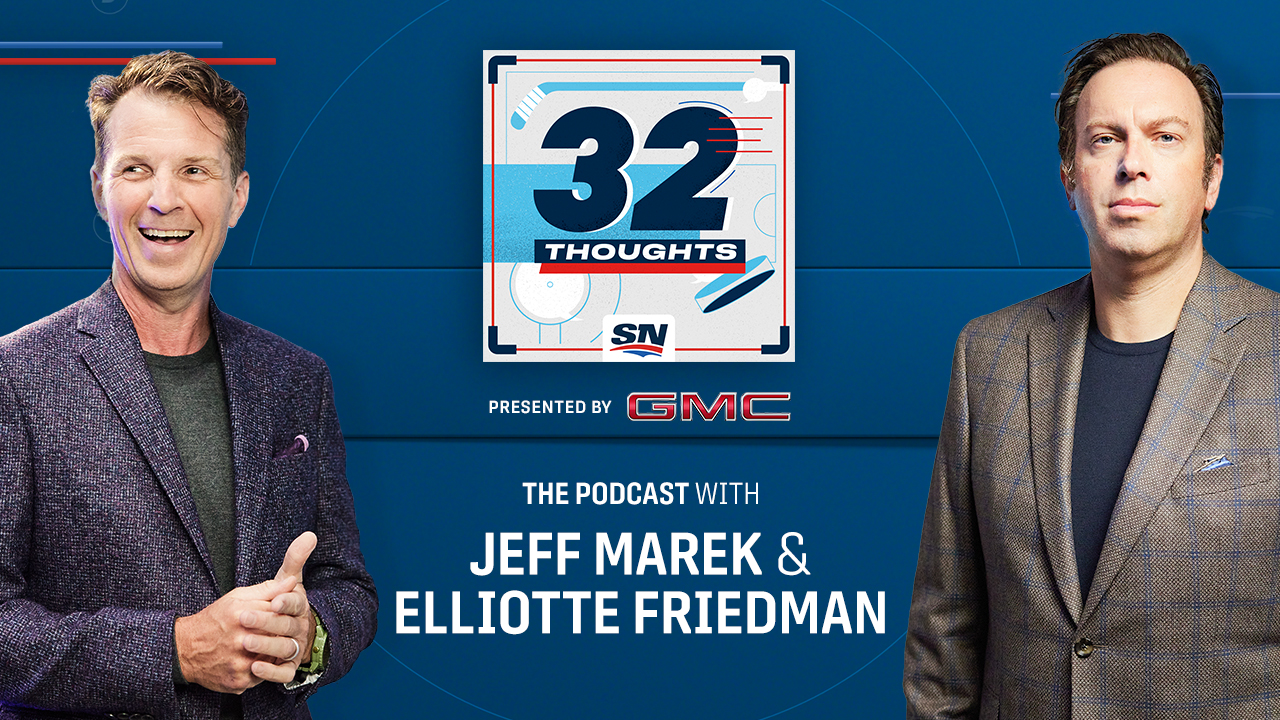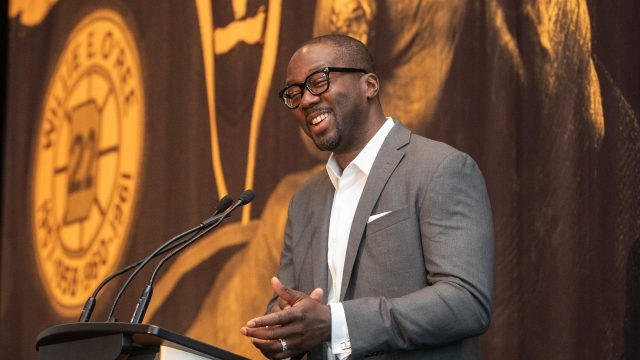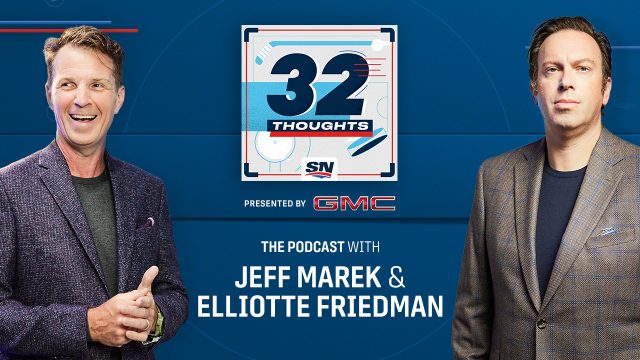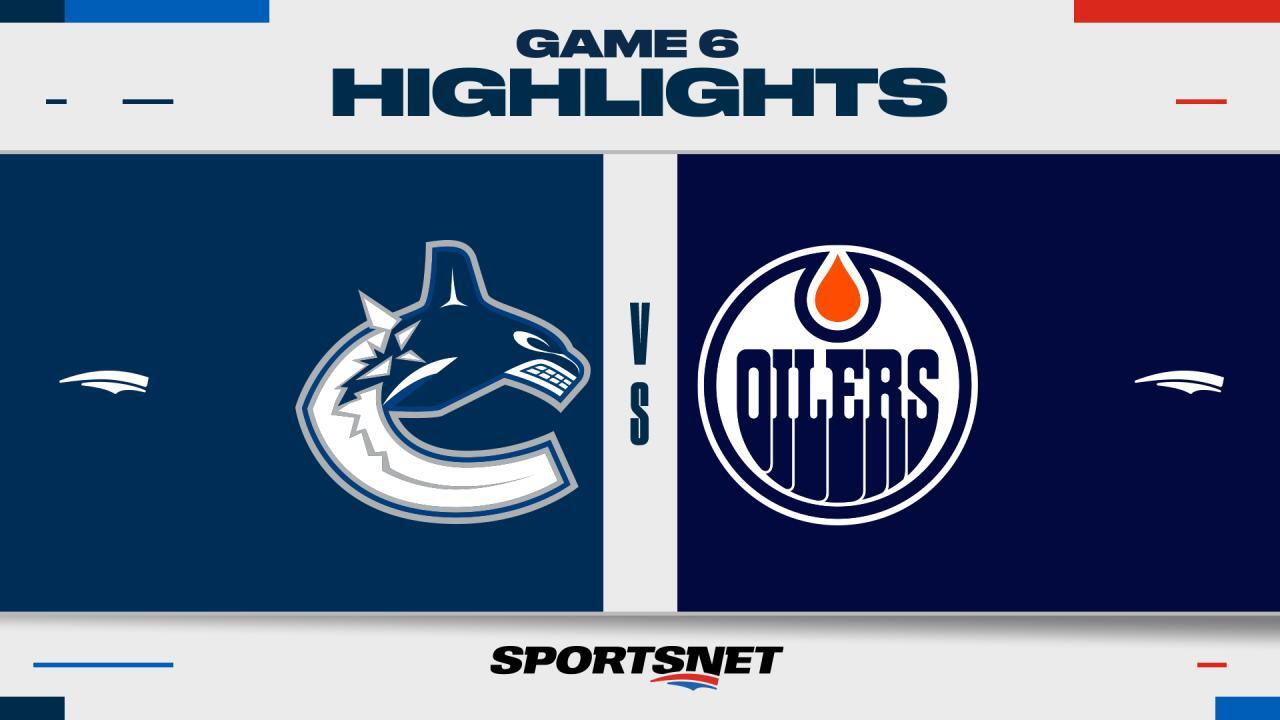
ATLANTA — When it comes to discussing the intersection of the past and the future of the National Hockey League in Atlanta, long-time NHLer and national broadcast analyst Anson Carter likes to refer to a Friday night in late October of 2010 as an auspicious one.
On that night the ill-fated Atlanta Thrashers played at home against the Tampa Bay Lightning. The announced attendance was 9,138, roughly 50 per cent of the capacity of Philips Arena, the downtown arena where the Thrashers played for the dozen years they were in Atlanta.
Exactly 44 kilometres north on that same night, the ECHL Gwinnett Gladiators hosted the South Carolina Stingrays, where the announced attendance was 10,076.
A cynic — and there are lots when it comes to discussing the possible return of the NHL to Atlanta for a third go-round — would point out that it’s never a good thing when your local ECHL team outdraws the NHL squad.
But Carter’s view is the wide view.
In two arenas in different parts of the community, close to 20,000 paying hockey fans showed up. That is why Carter, the high-profile leader of a group of investors pursuing a return of the NHL to Atlanta, is so bullish on what the future holds for hockey fans in Georgia.
A little more than six months after that late-October night the Thrashers were done, headed west to Winnipeg without leaving so much as a ripple on the local sporting landscape.
It remains one of the NHL’s greatest expansion disasters, a grand opportunity squandered.
Now, 13 years later, the Atlanta sports scene is once again abuzz with a discussion about whether the NHL has a place in the city.
Long-time Atlantan and pro sports executive Stan Kasten, the first president of the Thrashers, said in a series of email messages that it’s important not to compare the first two departures when it comes to assessing the future.
The Atlanta Flames, who played downtown between 1972 and 1980 before becoming the Calgary Flames, came at a different time, in a different city, with different circumstances.
The sad story of the Thrashers, however, is entirely relevant to all that is unfolding now.
The Thrashers arrived in 1999 during a period of vigorous expansion by the NHL. If you created a definitive list of what not to do, Atlanta ownership checked pretty much every box.
“Ownership made it a miserable experience,” Carter said.
Original owner Ted Turner, who built CNN and Turner Sports into broadcast giants, sold the team in 2003 to the Atlanta Spirit Group. Never wholly embraced by the Turner ownership, the Thrashers became a total afterthought under the Atlanta Spirit Group.
Kasten, now president of the Los Angeles Dodgers and one of the founders of the successful new Professional Women’s Hockey League, believes in the Atlanta market.
“I have no doubt whatsoever that a hockey team in a good location with an up-to-date modern arena would be extremely successful in Atlanta,” Kasten said.
While it’s staggering to think that a city that has as much going for it as Atlanta couldn’t sustain the Thrashers, it is also a very different community than when the Thrashers slunk out of town in 2011.
The population of the metro Atlanta area has gone from about 3.5 million to more than six million and the Atlanta Regional Commission (ARC) forecasts the area’s population will approach eight million by 2050.
Metro Atlanta is incredibly diverse at a time when the NHL is determined to become more inclusive and welcoming. Carter, in fact, is co-chair of the joint NHL/NHLPA Player Inclusion Coalition as well as providing regular analysis for Turner’s national broadcasts in the U.S., as well as for Sportsnet.
Atlanta’s population is roughly 50 per cent Black, while the Hispanic community is projected to almost double by 2050 according to the recent ARC report. There is also a large LGBTQ+ community.
According to Nielsen rankings, Atlanta is the seventh-largest media market in the United States.
Georgia is also home to 19 companies on Fortune’s list of top 500 revenue producing companies in the United States.
Of course the reality is that Atlanta was a big city and a big media market when the team pulled up stakes and moved to a Canadian prairie city a fraction its size.
If the market isn’t fully engaged and if ownership isn’t committed to putting all the building blocks in place, no matter the cost, then the market size and number of Fortune 500 companies are irrelevant.
Carter, who has been exploring potential ownership opportunities for about 15 years, has called Atlanta home along with his family shortly after retiring in 2008.
He is now the driving force behind the Alpharetta Sports and Entertainment Group (ASE), which recently announced its intention to develop the North Point Mall in Alpharetta, north of Atlanta, with an NHL-ready arena as its centrepiece.
Among Carter’s partners are Neil Leibman of Top Tier Sports, a Houston-based sports investment company, Aaron Zeigler of Zeigler Automotive, and Peter Simon, part of the ownership group of the QMJHL’s Halifax Mooseheads. The group has also partnered with New York Life’s real estate arm.
The ASE announcement came after automotive mogul Vernon Krause announced a $2 billion development plan further north in Forsyth County that is also aimed at providing a home for a new NHL team.
Forsyth County officials last week voted to approve the development plan known as The Gathering. After the meeting, though, various reports indicated Krause’s group was disappointed in some of the changes the municipality made to the agreement.
Both arena proposals would include a mix of hotel, retail, restaurants and residential housing. The Alpharetta proposal would include a 10,000 seat soccer complex and a separate four-pad hockey complex that could, in theory, house an American Hockey League team, Carter said.
Both locations are north of I-285, the perimeter highway that rings the greater Atlanta area and represents a line of demarcation from the city proper and the affluent northern suburbs where most of the existing hockey community lives.
The Alpharetta proposal includes plans for a new spur of linked transit buses that would run on a dedicated lane from the existing transit rail system to the North Point Mall.
“That to me is a game-changer,” Carter said of the mass transit plans. “It’s definitely going to happen.”
The fact there are two groups competing to bring NHL hockey back to the Atlanta area merely reinforces that the idea has merit, Carter said.
“I think it’s great that people see what I’m seeing. Hockey back in Atlanta obviously makes a lot of sense,” Carter said. “I’m not competing with anyone to put a shovel in the ground.”
Whether the league needs to grow from its current 32-team slate is a separate debate.
But the money involved suggests further expansion is virtually a given.
Vegas and Seattle paid a combined $1.15 billion in expansion fees dispersed to the league’s 30 other owners. The players do not share in any expansion fees, although when the current collective bargaining agreement comes to an end after the 2025-26 season it’s easy to imagine that would be a significant point of discussion.
It also helps explain why there is widespread belief the NHL would entertain further expansion sooner than later.
Expansion fees are likely to start at $1 billion. So, having deep pockets is a given whether you’re talking Atlanta, Salt Lake City, where Utah Jazz owner Ryan Smith has also announced his intentions to bring NHL hockey to Utah, Houston or anywhere else.
But it takes more than just money and a shovel. It’s a complex, layered process building up a pro hockey team from the ruins of another.
That is why Carter consistently talks about a hockey-first ownership.
He is already gathering together the many community threads that will be required to forge a strong and lasting bond with a new NHL club. That means galvanizing the local youth hockey community and local club teams at area colleges, something that never happened when the Thrashers were in town.
“Now, finally, everyone’s on the same page,” Carter said. “I’ve taken a completely opposite approach because I want to work with these groups. You can’t shoot a cannon from a row boat. You need to have a strong base. You have to focus on the roots, not the fruit.”
Jeff Schultz is among a large group of locals who believe that the North Point Mall location makes the most sense of the two proposed sites. But the recently retired journalist admits he is skeptical the potential stumbling blocks can be avoided, including the money required, whether a battered fan base will coalesce again and whether NHL commissioner Gary Bettman would sign off on a return to Atlanta given how things ended here with the Thrashers.
“From a fan perspective I think it would be great. My personal view is honestly, and maybe this is just me, I don’t know that the enthusiasm or the anticipation of an NHL team coming to Atlanta is remotely as great now as it was before the Thrashers were given a team,” Schultz said.
Maybe. And maybe there has been enough change in this community and in the game itself to create what would effectively be a clean slate in Atlanta.
Scott Pearson has been an Atlanta resident and local hockey fixture since 2001.
The sixth-overall pick of the Toronto Maple Leafs in 1988, Pearson still offers skills sessions for players of all ages and abilities at The Cooler in Alpharetta, not far from the proposed arena project at North Point Mall.
“I know obviously in the past it has not worked out the last two times but it’s a different era,” Pearson said. “It’s a different dynamic. No doubt in my mind that it would work this time.”
Remember that long-ago night in October, 2010? Derek Nesbitt does.
“Like it was yesterday,” said Nesbitt who grew up near Seaforth, Ont., where his dad ran the local rink.
Nesbitt scored three times, had an assist and was first star of the game for the hometown Gladiators that night. Nesbitt, as it turned out, had more staying power than the Thrashers.
The former Gladiators captain and now head coach of the ECHL Atlanta Gladiators played more than 1,000 minor-pro games without ever cracking an NHL lineup.
He is the father of a five-year-old hockey-mad boy and has been involved in the Atlanta Phoenix youth program based in Duluth, where the Thrashers used to practice.
He shares Pearson’s enthusiasm for the North Point project and what lies ahead for both the NHL and Atlanta. He joked the new owners would need to have a separate building to house all the money they would make.
“I think there’s a lot of pieces in place,” Nesbitt said.
The fact a team has failed twice before?
“It doesn’t honestly concern me for a second,” Nesbitt said. “It’s about ownership and location to me here.”
Same as it ever was.
Scott Burnside is an award-winning journalist, former president of the Professional Hockey Writers’ Association, co-author of the best-selling true crime book ‘Deadly Innocence’ and resident of the Atlanta area since 2002.







